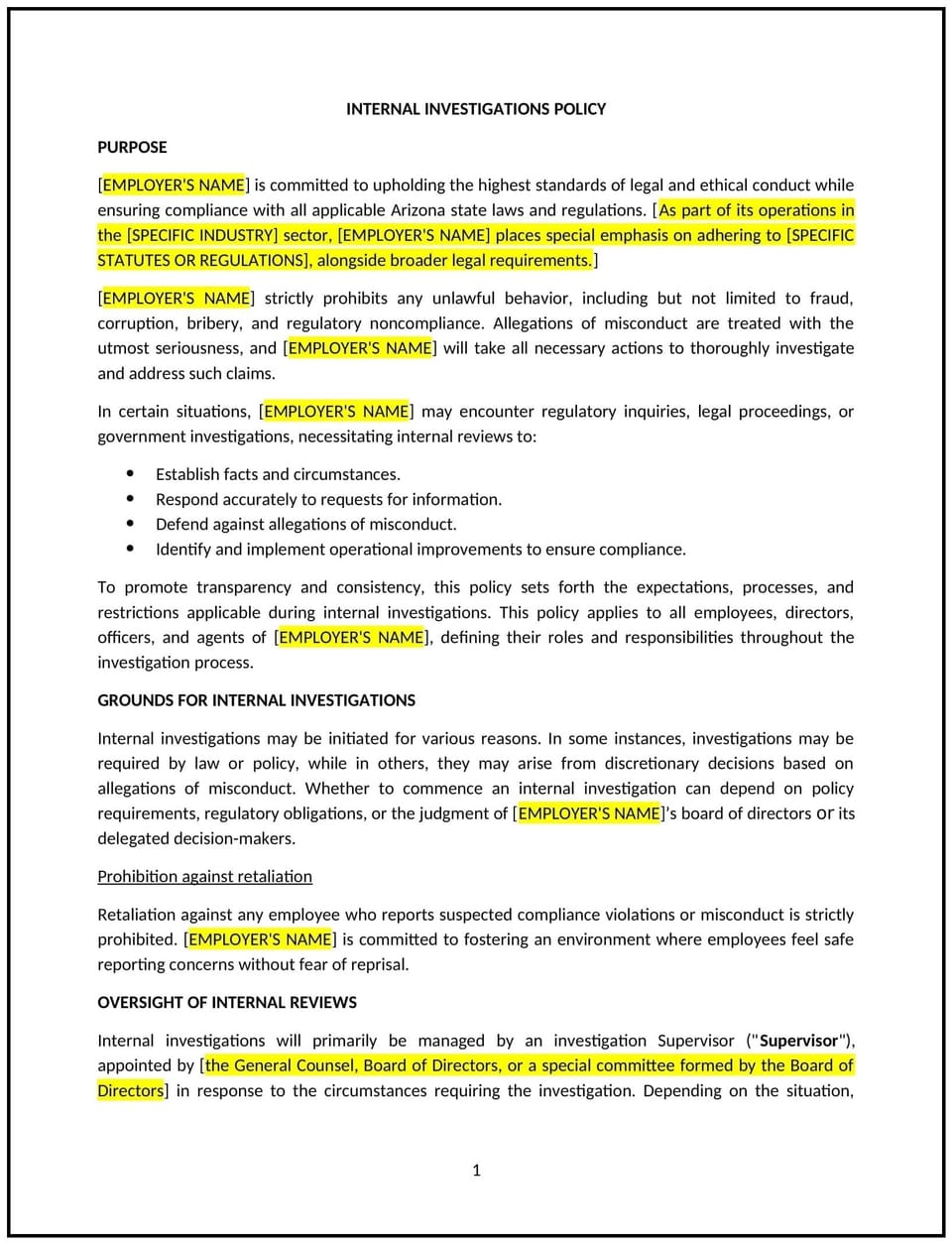Internal investigations policy (Arizona): Free template

Internal investigations policy (Arizona)
In Arizona, an internal investigations policy provides businesses with a structured approach to addressing workplace concerns, such as misconduct, harassment, or compliance violations. This policy helps ensure fair, consistent, and thorough investigations while supporting compliance with state and federal regulations.
This policy outlines procedures for initiating, conducting, and resolving investigations, including confidentiality measures and documentation standards. By implementing this policy, Arizona businesses can mitigate risks, maintain workplace integrity, and protect their reputation.
How to use this internal investigations policy (Arizona)
- Define investigation triggers: Specify the types of incidents or allegations that warrant an investigation, such as harassment, fraud, or policy violations.
- Assign responsibilities: Identify who will conduct investigations, such as HR personnel, compliance officers, or external investigators, depending on the situation.
- Establish procedures: Provide step-by-step guidelines for handling investigations, including gathering evidence, interviewing parties, and documenting findings.
- Emphasize confidentiality: Outline how information will be kept secure and shared only on a need-to-know basis to protect all parties involved.
- Resolve and document: Detail how findings will be communicated, corrective actions implemented, and records securely stored.
Benefits of using an internal investigations policy (Arizona)
This policy offers several advantages for Arizona businesses:
- Mitigates legal risks: Ensures investigations are conducted in a fair and compliant manner, reducing exposure to legal disputes.
- Protects reputation: Demonstrates the company’s commitment to addressing issues professionally and transparently.
- Enhances consistency: Standardizes the investigation process, ensuring all cases are handled with equal diligence.
- Builds trust: Reinforces confidence among employees, clients, and stakeholders by showing the organization takes concerns seriously.
- Supports compliance: Aligns with Arizona and federal laws, such as anti-discrimination and workplace safety regulations.
Tips for using an internal investigations policy (Arizona)
- Address Arizona-specific considerations: Include state laws or industry-specific regulations that may affect investigation processes or reporting requirements.
- Train investigators: Ensure those conducting investigations are trained in legal compliance, confidentiality, and effective interviewing techniques.
- Use third-party support: Engage external investigators for highly sensitive or complex cases to ensure impartiality and expertise.
- Regularly review: Update the policy to reflect changes in laws, organizational practices, or lessons learned from past investigations.
- Communicate clearly: Inform employees about the existence and purpose of the policy while maintaining transparency about the process.
Q: What types of incidents typically require an internal investigation?
A: Common triggers include allegations of harassment, fraud, discrimination, policy violations, safety concerns, or compliance breaches.
Q: Who is responsible for conducting investigations?
A: Investigations are typically handled by HR personnel, compliance officers, or external investigators, depending on the case's complexity and sensitivity.
Q: How does the company ensure confidentiality during investigations?
A: The policy mandates that information is shared only with authorized individuals on a need-to-know basis, and all records are securely stored.
Q: What steps are taken to resolve investigations?
A: Findings are documented, corrective actions are implemented, and outcomes are communicated to relevant stakeholders, ensuring appropriate follow-through.
Q: How does this policy support compliance with Arizona laws?
A: The policy aligns with Arizona labor and workplace laws, ensuring investigations are fair, thorough, and legally compliant.
This article contains general legal information and does not contain legal advice. Cobrief is not a law firm or a substitute for an attorney or law firm. The law is complex and changes often. For legal advice, please ask a lawyer.


